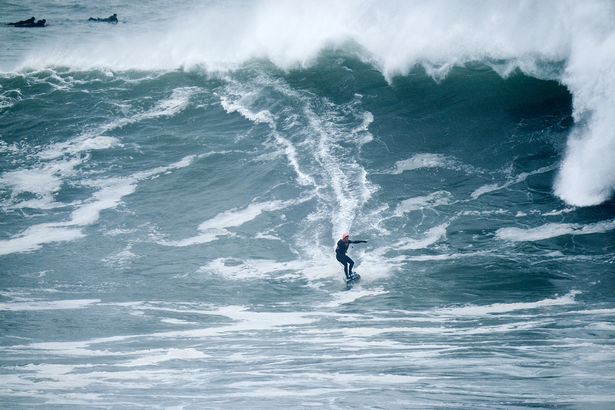2022 Dedh Dogens hag Eth
De Yow, seytegves mis Whevrel
Thursday, 17th February
Ma Enawel Eunice ow tos. E vedh gwens. E vedh hûjes todnow war an als noor, martesen deg troshes warn ügens dhe hanter dedh. Saw na vedh an todnow da rag mordartha. (Gramassy dhe CornwallLive rag an foto a'n Cribbar - na vedh an todnow glan pecar'a holma.) Anjei a vedh diantel. Ma gwarnyans, "Bedhowgh parys rag livyow ogas dhe'n mor." Parys o nei rag an gwens et ow lowarth. Thew keniver tra saw. Lebmyn my ell pedery a'm nessa descans!
Storm Eunice is coming. There will be wind. There will be huge waves on the north cost, perhaps 30ft at midday. But the waves won't be good for surfing. (Thanks to CornwallLive for the photo of the Cribbar - the waves won't be clean like this one.) They will be dangerous. There is a warning, "Be prepared for floods near the sea." We are ready for the wind in our garden. Everything is secure. Now I can think of my next lesson.
Cressya emann agas tavas Kernowek. Radn 3b
Building up our Cornish language. Part 3b
Hedna and hebma are masculine and singular, so here are the feminine singular equivalents;
hodna for hedna and hobma or holma for hebma, used if you know that the noun is feminine.
(If in doubt, the default is masculine.)
Hodna ew bûgh. That (one) is a cow.
Holma ew gaver. This (one) is a goat.
All of these pronouns can be written without pre-occlusion, especially if they are shortened:
henna/honna and hemma/homma.
Henn'ew margh. That's a horse.
Honn'ew davas. That is a sheep.
Hemm'ew cawrvargh. This is a camel.
Homm'ew edhen. This is a bird.
For plurals we do not have separate masculine and feminine (or mixed) demonstrative pronouns, and we still use "ew" as the verb. (So "ew" can mean "is" or "are".)
An re na ew gwedh. Those are trees.
An re ma ew fav. These are beans.
We do not use Pandr'ew? for people (unless we are being deliberately insulting), so:
Piw ew hedna? indicates a distant person (male or unidentifiable).
Piw ew hodna? indicates a distant female.
Piw ew hebma? indicates a male nearby
Piw ew holma? indicates a female nearby
Hedna ew tiek. That is a farmer.
Henn'ew an descador. That is the teacher.
Hodna ew an Vetêrnes. That is the Queen.
Honn'ew morvoren. That is a mermaid.
Hebma ew agan Dûk. This is our Duke.
Hemm'ew den whel. This is a workman.
Holma ew ow mabm. This is my mother.
Homm'ew hy mabm hei. This is her mother.
Plurals can also be used with Piw ew..?
Piw ew an re na? Who are those (ones)?
Piw ew an re ma? Who are these (ones)?
An re na ew ow mebyon. Those are my sons.
An re ma ew aga flehes. These are their children.
Any of the above can be turned into questions, e.g.
Ew holma ow mabm? Is this (one) my mother?
Ew an re na ow mebyon? Are those my sons?
Ew an re ma aga flehes? Are these their children?
Ew hedna an descador? Is that (one) the teacher?




No comments:
Post a Comment